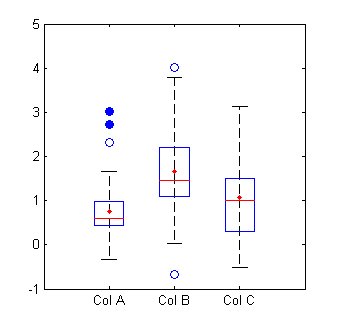

I have adjusted the upper and lower whiskers (although lower whisker is not needed in this example) using the following code however this code doesn't remove outliers within the whisker making the result look unclear. Is there a way to specify 95 or even 76 to be within the whiskers? or the value of the upper whisker? Please can the method to change this be explained.įor example, for the following 100 pieces of data: MATLAB's default behaviour is to have the whisker length = 1.5 * IQR (75th percentile - 25th percentile) and this whisker length can be changed to another multiple of IQR, but not to a specific percentile. I'd like to use the 95th percentile as the upper whisker and 5th percentile as the lower whisker. Here, 1.5 IQR above the third quartile is 88.5 ☏ and the maximum is 81 ☏.For boxplots in MATLAB, I'd like to ask if a specific percentile can be used as the upper whisker. The upper whisker boundary of the box-plot is the largest data value that is within 1.5 IQR above the third quartile. Box and whisker plots are produced from the entirety of the data, not just the statistics.

Unfortunately, this is not enough information to create a box plot.
#BOX AND WHISKER PLOT MATLAB SERIES#

Flier points are those past the end of the whiskers. The whiskers extend from the box by 1.5x the inter-quartile range (IQR). Same box-plot with whiskers drawn within the 1.5 IQR valueĪ boxplot is a standardized way of displaying the dataset based on the five-number summary: the minimum, the maximum, the sample median, and the first and third quartiles. The box extends from the first quartile (Q1) to the third quartile (Q3) of the data, with a line at the median. Box plots can be drawn either horizontally or vertically.įigure 3.

In addition, the box-plot allows one to visually estimate various L-estimators, notably the interquartile range, midhinge, range, mid-range, and trimean. The spacings in each subsection of the box-plot indicate the degree of dispersion (spread) and skewness of the data, which are usually described using the five-number summary. Outliers that differ significantly from the rest of the dataset may be plotted as individual points beyond the whiskers on the box-plot.īox plots are non-parametric: they display variation in samples of a statistical population without making any assumptions of the underlying statistical distribution (though Tukey's boxplot assumes symmetry for the whiskers and normality for their length). In addition to the box on a box plot, there can be lines (which are called whiskers) extending from the box indicating variability outside the upper and lower quartiles, thus, the plot is also termed as the box-and-whisker plot and the box-and-whisker diagram. In descriptive statistics, a box plot or boxplot is a method for graphically demonstrating the locality, spread and skewness groups of numerical data through their quartiles. Box plot of data from the Michelson experiment


 0 kommentar(er)
0 kommentar(er)
